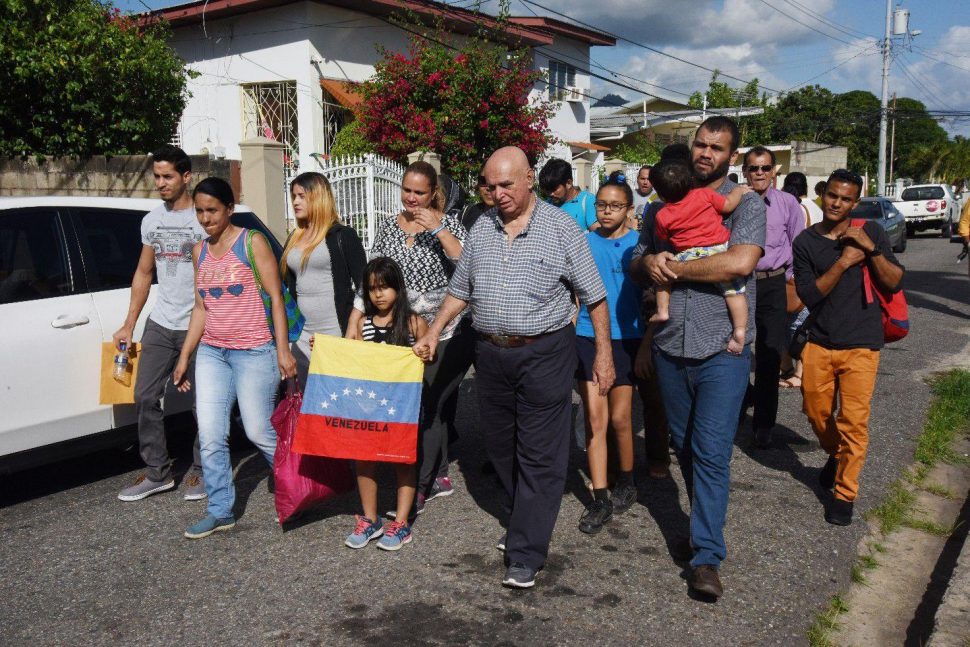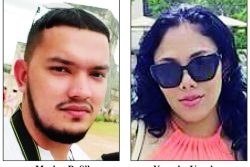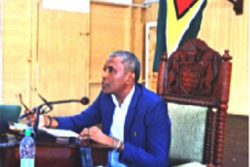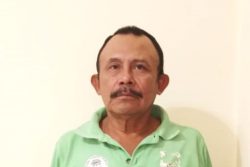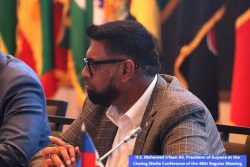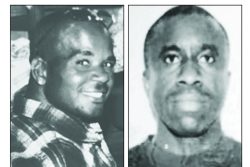(Trinidad Express) ABUSE. Sexual assault. Blackmail. Victimisation by both citizens and law enforcement.
These were just some of the horrifying allegations made yesterday by men and women from Venezuela and Cuba who told of the problems they’ve endured since they came to Trinidad seeking asylum.
More than 30 men, women and children assembled at Grant Avenue, Mt Lambert, to speak to reporters yesterday.
The group came together and recalled incidents of how they have been taken advantage of, persecuted and victimised in Trinidad and Tobago, as they tried to find sanctuary away from life-threatening conditions in their home countries.
Many of them broke down in tears as they recalled what they have been through.
In the end, they pleaded with the authorities to intervene, with members indicating they have written a letter to Prime Minister Dr Keith Rowley for help.
Copies of the letter are to be delivered to the office of the Minister of National Security and the office of the Commissioner of Police as well.
Most said they had refugee status or were asylum-seekers, and proudly displayed documents and cards to illustrate their status.
Documents not enough
However, despite being in possession of these documents, they said they were still targeted, victimised, even charged and brought before the courts, as many police officers refused to acknowledge their status.
Activist Yesenia Gonzales, who has lived in Trinidad for many years, told the Express she had heard Government ministers on TV telling the public many of the foreigners held in the Immigration Detention Centre were there because they had not applied for refugee or asylum status—a claim she countered by saying many of these people were in possession of refugee cards and applications.
But in the eyes of this country, these documents were not enough.
“You make an application (at the UNHCR in Port of Spain) and are given a card, and told it has to go through a process, which can last from months to years. In the interim, they give you documentation indicating as such. But if you are walking the roads just to get groceries or anything like that, these papers are not enough. “You will have officers who will arrest you regardless, telling you the law is that your passport has to be stamped properly or you have to have direct documentation approving your stay. Applications are not enough. So then you end up before courts,” Gonzales said.
‘Making slaves of us’
Another Venezuelan national, Martha Tobar, pleaded with the Government to put things in place to treat with refugees and asylum seekers, saying the current system was only leading to persecution and victimisation.
“This is the only country that we can come to that gives us even a remote chance of improving our lives. If we could have gone to another country and avoid the hardships here, or the victimisation we experience, we would. But we don’t have those options. Most people give up everything they have to leave Venezuela and come here. The other option is that they kill you. So it’s either we come here, or we lose our lives. This is our reality. And most times, the documents you have, passports, identification cards, birth certificates, all these things are either destroyed or left behind due to circumstances. So we literally come here with the clothes on our backs. That is all we have.
“But then when we arrive here, there is no protection. It is not as bad as Venezuela, but it is not much of an improvement either. Because as soon as people know that you are running away, as soon as they know that you don’t have anything, they try to take advantage of you. Man or woman. It doesn’t matter. They will basically make slaves of you, or in some cases send people into prostitution.”
Tobar continued: “The situation is so bad that there are immigration officers who are blackmailing us. If they see us on the roads, they will pull us aside, tell us give them money, or they will bring the police. But where are we getting this money? If we hold to the conditions of the applications, we can’t work. If we break the conditions, we are brought before the courts because we have broken the laws of the land. So where is the care? Where is the understanding and compassion for your fellow human beings?”
Month of hell
Among the stories which were given yesterday was that of a young woman who endured what she said was a “month of hell” trying to reach Trinidad and Tobago.
She told the Express that on November 29, she arrived in this country legally.
However, she claimed immigration officials refused to allow her into the country.
“They said that I could not leave Immigration because I didn’t have anyone to go by and that no one was there to claim me. I told them that my friend was outside and they said they checked and no one was there. They didn’t allow me to call or check via Internet messages. They deported me the following day. I learned upon returning to Venezuela that this was all a lie. My friend was outside waiting the whole time. And he said he was never approached nor heard his name called or anything,” the woman recalled.
However, she was desperate to try to make some money to send back to her 15-year-old brother and father, and she admitted she returned to the country illegally on December 8.
She spent a few days with people she thought she knew and trusted, but on December 13 she said she was “set up” and kidnapped.
The woman said she and another Venezuelan friend were beaten and sexually assaulted by a group of men, and moved around from house to house.
They endured this for several days until they were rescued from their kidnappers by police.
The woman said what was worse was that she spent more time in police custody than the men she alleged assaulted her, as police investigators told her she was here illegally, and as a result she did not have any rights.
Eventually, she was released and applied for refugee status.
But she said the people who kidnapped her were eventually freed from custody and she has been told they are looking for her.
“This is not a situation I am wishing on anyone. I came here to work to send back things for my family, but instead I was given the worst treatment that any human being can be given. My advice to Venezuelans who are coming to this country, male or female—until the Government steps up and fixes the persecution we face here, trust no-one. People who claim they are helping you, they will sell you in a heartbeat because they know it will benefit them and they know the authorities simply do not care on what happens to us,” the woman said.
How application process works
An application is made and in response to this, a certificate is given to the person, identifying he/she as an asylum seeker.
The certificate identifies the applicant, their UNHCR (United Nations High Commissioner for Refugees) registration number, date of registration, country of birth, country of asylum, and arrival date.
Following this is a letter, which is stamped by the UNHCR, in which it is noted that the applicant is an asylum seeker whose application is being processed.
The letter states, “(name) is a person of concern to the UNHCR and should be protected from forcible return to a country where she would face persecution, pending a final decision on her refugee status. Any assistance accorded to the above named individual would be appreciated.”
Attorney General Faris Al-Rawi has been criticised for statements on legislation for refugees and asylum seekers.
Amnesty International has said this country was a signatory to the 1951 Refugee Convention and its 1967 Protocol.
Al-Rawi said that the convention has not been ratified and must be enacted in domestic law.
